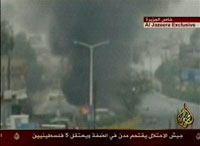No Americans hurt in attacks on US Embassy in Yemen
Two suicide car bombs exploded outside the the U.S. Embassy in Yemen's capital on Wednesday, killing six guards and four civilians outside, Yemeni officials said. No Americans were reported hurt.

The bombing was the deadliest attack on a facility that has been targeted four times in recent years by bombings, mortars and shootings. Yemen, the ancestral homeland of Osama bin Laden, has struggled to put down al-Qaida-linked Islamic militants, often to the frustration of U.S. counterterrorism officials.
The blasts came just a month after the State Department allowed the return of non-essential personnel and family members who had been ordered to leave after a volley of mortars targeted the facility but hit a girl's high school next door, killing a Yemeni security guard and wounding more than a dozen girls.
In Wednesday morning's coordinated attack, the two blasts went off at a security checkpoint that witnesses said was about 40 meters (yards) from the embassy gates. Several gunmen also battled the embassy's Yemeni guards for 10 minutes, a Yemeni security official told The Associated Press, speaking on condition of anonymity because he was not authorized to talk to the press.
The state news agency SABA reported that the blasts were carried out by suicide bombers in two explosives-packed vehicles. The explosions hit passers-by and the guards and damaged nearby houses. Footage on Arab TV stations showed clouds of smoke rising from near concrete blocks painted yellow. The embassy is protected by two rings of these blocks, according to San'a residents familiar with the area.
Six attackers were killed, along with six Yemeni guards, three Yemeni civilians and an Indian national, SABA reported, citing an unidentified Interior Ministry official.
Ryan Gliha, an embassy spokesman, told The Associated Press that two explosions went off, at least one by a car bomb. He did not know the cause of the second. Speaking by telephone from inside the large embassy compound, he could not immediately say if there was any damage to the facility from the blast outside.
The embassy said in a statement only that the facility had been attacked by "armed terrorists," with a number of explosions "in the vicinity" of the main gate that killed an injured a number of guards and Yemeni citizens waiting to enter the embassy.
At least seven wounded civilians, including children from nearby houses, were taken to the capital's Republican Hospital, a medical official said, speaking on condition of anonymity because he was not authorized to talk to the press.
The attack highlighted the difficulties Yemen has had in reining in Islamic militants, who operate with considerable freedom intheimpoverished country, where much of the mountainous countryside is largely lawless.
The U.S. Embassy, in an eastern San'a district, has been targeted repeatedly - through previous attacks have been less organized. Besides the March mortar attack, a gunman opened fire outside the embassy in 2006. He wa shot and arrested by Yemeni guards.
In March 2002, a Yemeni man lobbed a sound grenade into the embassy grounds a day after Vice President Dick Cheney made a stop for talks with officials at San'a airport. The attacker was sentenced to 10 years in prison but the sentence was later reduced to seven years.
In 2003, two people were fatally shot and dozens more were injured when police clashed with demonstrators trying to storm the embassy when tens of thousands rallied against the U.S.-led invasion of Iraq.
This year has also seen mortar attacks near the Italian Embassy and a bombing on a compound housing foreigners, neither of which caused casualties.
Washington considers Yemeni President Ali Abdullah Saleh an ally in the war on terror, ever since al-Qaida's 2000 bombing of the USS Cole destroyer in the port of Aden, which killed 17 American sailors. A similar attack on a French oil tanker two years later killed one person.
But the relationship has frequently been rocky, with American officials grumbling over lax Yemeni detention policies for militants.
A group of 23 al-Qaida militants escaped from a high-security San'a prison in 2006, amid reports of collusion between security officials and the militants. The U.S. security think-tank Stratfor said in a statement Wednesday that Yemen's security and intelligence services are deepy infiltrated by militants.
Saleh has also pursued a program letting some militants go free after promising not to carry out attacks.
The U.S. was angered when a Yemeni-American, Jaber Elbaneh, convicted in Yemen for planning attacks on oil installations, was freed as he appealed his 10-year prison sentence. Elbaneh has since been taken back in custody, Yemeni officials say, but San'a has refused American requests that Elbaneh be handed over to the U.S. for trial on charges of provide material support or resources to a foreign terrorist organization.
American officials were also alarmed when Yemeni courts commuted a death sentence for Jamal al-Badawi, convicted of masterminding the Cole attack, giving him instead 15 years in prison.
During a June visit to San'a, President Bush's homeland security adviser Kenneth Wainstein, homeland security adviser to President Bush, pushed Saleh for "strong and serious measures to be carried out in Yemeni courts to try the terrorists and to hold them accountable."
Subscribe to Pravda.Ru Telegram channel, Facebook, RSS!




